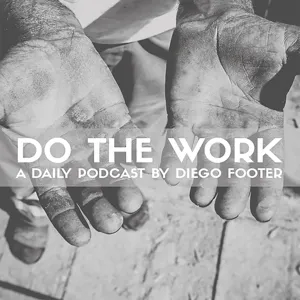Podcast Summary
The Importance of Admitting When We're Wrong: Admitting mistakes allows us to expand our knowledge and improve ourselves. Humility and openness to correction are crucial for growth.
Admitting we're wrong, even on small and seemingly insignificant matters, can be uncomfortable but is a necessary part of learning and growing. Angela Duckworth shared an embarrassing story about mispronouncing a Japanese shoe brand in front of an elderly Japanese neighbor. This experience reminded her of past instances where she held onto beliefs or ideas for a long time, only to later learn she was wrong. She asked Stephen Dubner if he had similar experiences, and they discussed the importance of humility and being open to correction. While it can be difficult to admit we're wrong, especially in public or on matters we hold dear, doing so allows us to expand our knowledge and improve ourselves. It's a reminder that no one is perfect and that learning is a lifelong process.
The theory of ego depletion challenged: Recent research questions the validity of the ego depletion theory, suggesting that the feeling of effort or displeasure may be a reminder of the cost of an action, rather than an actual depletion of resources.
The theory of ego depletion, which suggests self-control is a limited resource, has been challenged by recent research. Previously, it was believed that using up self-control in one task could lead to a decrease in ability to exert self control in subsequent tasks. However, studies have failed to replicate the initial findings, and it's now believed that the sensation of effort or displeasure associated with choosing a less desirable option serves as a reminder of the cost of the action, rather than an actual depletion of resources. The metaphor of self-control as a limited resource still holds some appeal, but the scientific evidence supporting it is not as clear-cut as once thought.
The importance of intellectual humility for growth and adaptation: Recognizing the value in questioning our beliefs and being open to change, even if it's uncomfortable, is crucial for intellectual growth and adapting to new evidence and opposing viewpoints.
Intellectual humility is crucial for academics and individuals in any field to grow and adapt in the face of new evidence and opposing viewpoints. The discussion highlights the case of a psychologist who built a reputation around the concept of grit but acknowledged the importance of being open to criticism and reevaluating his beliefs. Despite the potential discomfort and potential impact on his reputation, he recognized the value in questioning his own opinions and being open to change. The intellectual humility quiz mentioned in the conversation serves as a reminder that being intellectually humble involves more than just agreeing with new information; it also means recognizing the value in diverse perspectives and being open to the possibility that our beliefs may be wrong.
Embracing being wrong for growth: Admitting mistakes and learning from new information promotes intellectual humility and personal growth.
Acknowledging and admitting when we are wrong can be a challenging and uncomfortable experience, even when it involves new information that contradicts our beliefs. This feeling of being wrong can be particularly painful when our identities are closely tied to our opinions and research. However, observing individuals like Daniel Kahneman, who embrace being wrong as an opportunity to learn, can help us adopt a healthier attitude towards intellectual humility. By recognizing that our beliefs may not always be correct and that new information is valuable, we can improve our understanding and grow as individuals. The fundamental attribution error, a psychological phenomenon where we overly attribute people's behavior to their personalities rather than situational factors, can hinder our ability to change our minds. To overcome this, we can build intellectual humility into our identities and view ourselves as curious and open-minded individuals.
Our perception of reality is influenced by biases and assumptions: Recognize that our beliefs may not align with objective reality and be open to reconsidering them when presented with new information
Our perception of objective reality is influenced by our personal biases and the way our minds make inferences. The illusion of personal objectivity can lead us into trouble, especially when it comes to sensitive topics like politics and relationships. Changing our minds can be costly, particularly for politicians, but it's essential for growth in areas like science, sports, and investing. We're all prone to making mistakes and holding onto beliefs despite new evidence, but being open to changing our minds is crucial for learning and understanding the world around us. The human mind is a meaning-making machine, and we're constantly making assumptions and jumping to conclusions. It's important to recognize that our beliefs may not align with objective reality and be willing to reconsider them when presented with new information.
Adversarial collaboration for belief adjustments in politics: Collaboration between opposing parties in projects can lead to belief adjustments and more productive discussions in politics
Clear and unambiguous feedback is essential for correcting incorrect beliefs. This concept, as discussed, is particularly applicable to measurable fields like sports and finance. However, when it comes to complex issues in areas like politics, finding such feedback can be challenging. An intriguing idea to address this issue is the adversarial collaboration method, where opposing parties collaborate on a project, agreeing to concede if their hypothesis is disproven. This approach has shown promise in various fields and could potentially lead to more productive discussions and belief adjustments in politics. Another example of sudden belief changes comes from the legalization of gay marriage, which seemed unlikely just a decade ago but eventually gained widespread acceptance. Although applying this concept to politics may not be straightforward, it offers a potential avenue for fostering more open-minded and adaptable perspectives.
The Power of Personal Experiences and Emotions in Driving Change: Personal experiences and emotions, particularly love, can lead to meaningful change. This process of inner conflict and resolution is not always easy, but it can ultimately result in progress.
Meaningful change often comes about incrementally, and it can be driven by personal experiences and emotions, particularly love. This was exemplified in the acceptance of gay marriage, where even staunch opponents like Senator Rob Portman underwent a transformation after reflecting on their personal relationships. This process of inner conflict and resolution, which can lead to growth and learning, is not always easy or comfortable, but it can ultimately result in progress. In today's climate, it may be challenging for people to openly discuss their evolving beliefs, but doing so could lead to greater understanding and acceptance. Additionally, rewarding people for sharing their stories of change could encourage more open dialogue and promote a culture of growth and learning.
Embracing discomfort and new perspectives: Being open to new ideas and experiences, even if uncomfortable, can lead to learning and growth. Intellectual humility and being willing to reconsider beliefs can foster change and development in ourselves and others.
Experiencing cognitive dissonance and being open to new perspectives can lead to learning and growth. The speaker shared an experience from her childhood where she witnessed racial prejudice, which challenged her beliefs and made her question her upbrings. This discomfort led her to reconsider her views and recognize the potential for change and development in both herself and others. The conversation also touched on the importance of intellectual humility and being open to trying new things, even if they go against our previous beliefs or experiences. The speaker used the example of rum raisin ice cream to illustrate this point, as she had long disliked the flavor due to her father's preference for it. However, after reflecting on the idea of being open to new experiences, she began to consider the possibility that she might actually enjoy rum raisin. Overall, the conversation emphasized the importance of being open-minded, recognizing the potential for change, and being willing to reconsider our beliefs in light of new information or experiences.
Metaphors can still convey powerful meanings despite being mixed up: Metaphors, even if inaccurate, can effectively convey anticipation and anxiety. Historical fraternities may have a history of racial discrimination, and coincidences can lead to significant discoveries.
Metaphors, even if mixed up, can still convey powerful meanings. Steven's comment about waiting for the sword to drop, though seemingly a mix of "waiting for the other shoe to drop" and the ancient Greek metaphor, effectively conveys the sense of anticipation and anxiety. Another key takeaway is the historical significance and potential discrimination in professional fraternities. While many are associated with academic institutions and specific fields of study, some fraternal organizations, like the ones Angela's father might have belonged to, are separate from educational institutions and have a history of racial discrimination. Lastly, the fascination with coincidences and their potential significance was teased for next week's episode. The eerie similarities between the assassinations of Lincoln and Kennedy, despite occurring over a century apart, serve as a reminder of the power of coincidence and the human tendency to find meaning in seemingly unrelated events.






